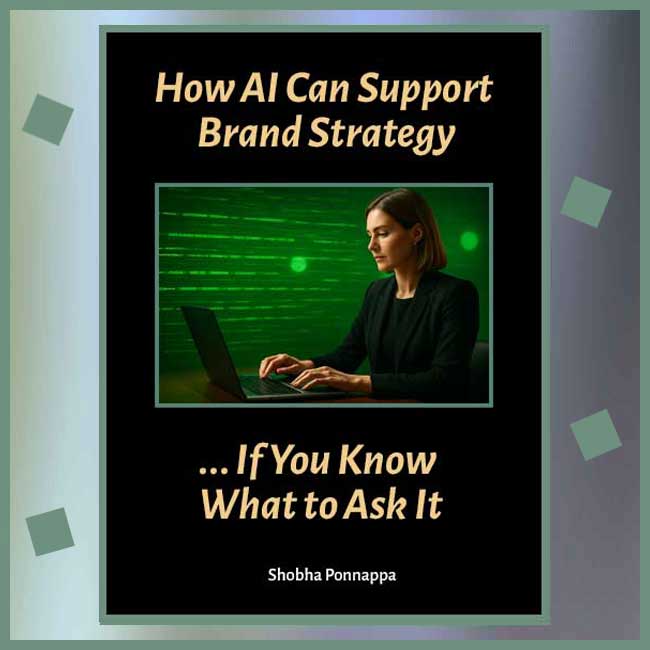
FOCUS: BRAND BURN RATE | AUDIENCE: INVESTORS IN SLUGGISH BRANDS
BY: SHOBHA PONNAPPA | BRAND BREAKTHROUGH STRATEGIST | 45 YEARS | 125+ CLIENTS
I answer 6 tough questions about how micro-campaigns often drain marketing budgets with little brand lift … and how to fix it.
I often speak with investors frustrated by brands that burn through marketing budgets with relentless activity … but no clear returns. Every quarter features a new influencer push, content series, mini-launch, or giveaway. But the brand’s equity doesn’t strengthen. Customers remain unaware or unmoved. That’s because activity isn’t strategy. When campaigns are fragmented and unanchored, they spend more than they signal. In this post, I tackle six core questions that arise when micro-campaigns become a drain rather than a driver.
Because they feel agile, inexpensive, and easy to execute. Micro-campaigns promise quick wins … social boosts, spike traffic, small sales bumps. They give a sense of action, of doing something. But many founders confuse motion with momentum.
What begins as one test campaign becomes a default habit. Soon the entire budget is split across scattered efforts with no through-line, no core message, and no cumulative effect. Without cohesion, these campaigns build no strategic equity.
Dilution. Not just of funds, but of positioning, recall, and trust. If every campaign tells a different story, uses a different tone, or targets a different persona, the brand starts to feel inconsistent. Worse, it feels like it’s trying too hard to be liked.
Buyers don’t just forget the brand … they fail to form an impression at all. Brand-building requires repetition, not novelty. Without anchoring your efforts around a core idea, campaigns become confetti: momentarily visible, quickly forgotten.
Look at the marketing calendar. If every month has a new objective, new channel, or new audience without any strategic scaffolding, that’s a red flag. Likewise, if creative assets are inconsistent in voice, tone, or visual identity, something’s fractured.
Another tell: low organic engagement or brand recall despite high paid impressions. When brands need to keep paying to stay relevant, they’re not earning loyalty … they’re renting attention. That’s a sign the brand message isn’t landing.
Yes … but only when nested within a larger, strategic campaign. Think of micro-campaigns as tactical branches. Without a trunk (your core brand narrative and campaign strategy), those branches break easily.
The strongest micro-campaigns channel audience curiosity toward a consistent brand belief. They support the big message. If they don’t reinforce a unified story or ladder up to a strategic goal, they’re distractions, not tools.
Prioritise depth over spread. Pick one clear campaign theme rooted in brand purpose or audience tension. Build layered content around it … owned, earned, paid. Use repetition, storytelling, and community triggers to build memory.
Then test small, yes … but within the same campaign. That way, every dollar reinforces the brand’s strategic arc. A $20K budget used for one strong idea executed across three touchpoints often performs better than twenty $1K experiments.
By shifting from campaign frequency to campaign clarity. Investors respond to narrative logic. Founders must articulate not just what they’ll do, but why it ladders to a bigger message and longer-term traction.
It helps to present a simplified strategy map: one core message, one campaign arc, one audience segment, and one set of KPIs. When founders show they’re building equity, not just running experiments, investor trust starts to return.
If these questions reflect what you’re seeing, your brand may not have a marketing budget problem … it has a message and structure problem. Real strategy focuses effort, sharpens recall, and conserves energy. Campaign chaos, on the other hand, just burns money and patience.
If you’re brand owner or manager seeking stronger brand performance, this FAQ Insight Post I wrote could interest you: “FAQs: When Product Features No Longer Excite or Differentiate.“
And if you’re a solo expert looking to sharpen traction, this FAQ Insight Post I worked on may resonate: “FAQs: Why Your Thought Leadership Isn’t Leading to Leads.“

"One BIG IDEA can turn brand stagnation into unstoppable movement. Spots are limited each week ... book your breakthrough session now."
Shobha Ponnappa
More Breakthrough Ideas … Case Studies & FAQs … from the Brand Burn Rate Category
Case Studies
FAQ Insights
Smart insights, real-world frameworks, and idea-driven clarity – designed to help brands move.
Get my fortnightly Brand Reframe newsletter. Smart insights, distilled thinking, and focused momentum to help your brand lead.

Get my free AI strategy guide. Smart prompts, sharper briefs, and practical ways to make AI support your brand momentum.

Just fill in the form to join. Get my newsletter and the guide shown alongside, all with several game-changing tips.